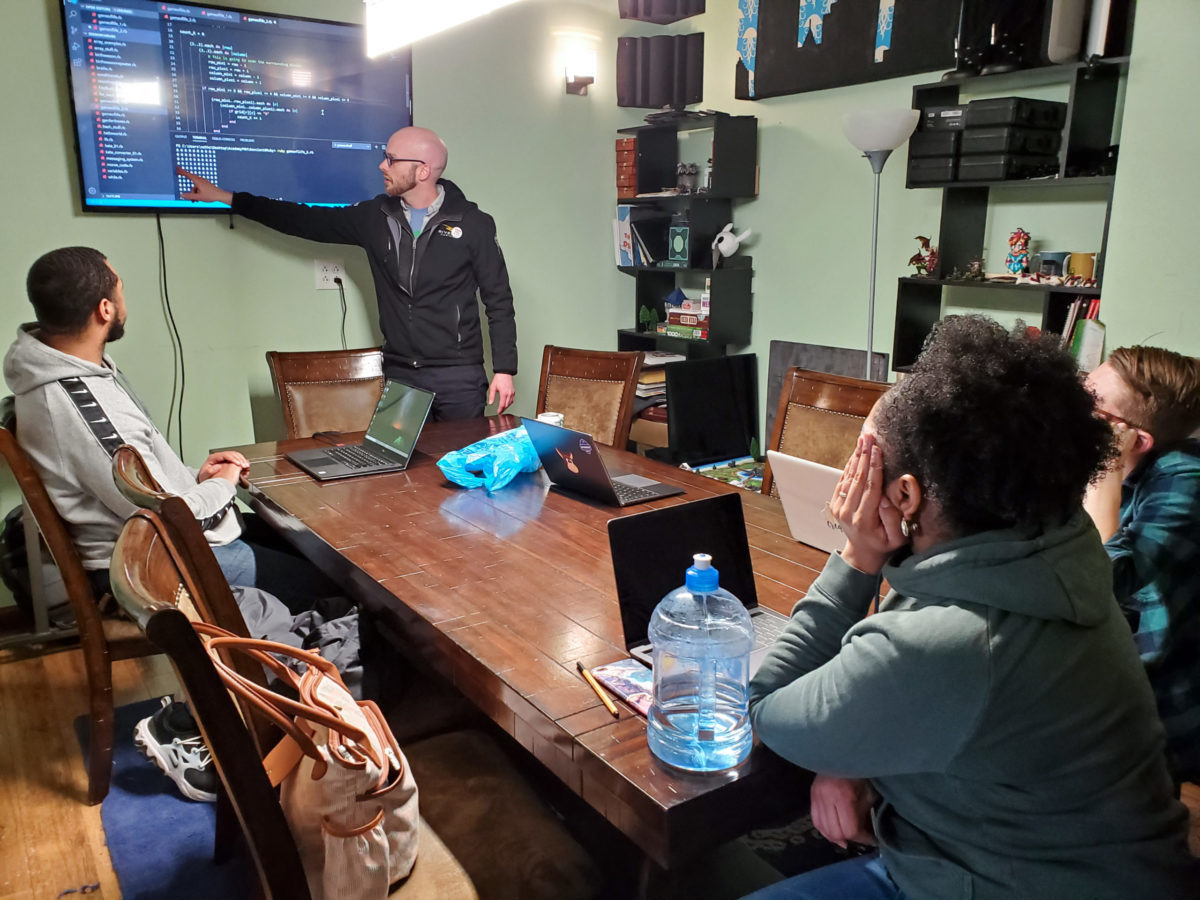Faced with lingering job vacancies and a workforce that remains too homogeneous, employers in the tech industry are increasingly falling back on a tried and true job training method to entice the next generation of tech workers.
The apprenticeship.
It was long a hallmark of tradespeople, from blacksmiths to carepenters. Now it’s a method to kickstart software careers.
“Everything old is new again, right?” said Jennifer Carlson, CEO of tech training provider Apprenti. “Everything goes through cycles. The building and construction trades, [and] manufacturing used apprenticeship in this country really effectively for… 85 years, and is kind of the basis of what we do today for apprenticeship.”
Pittsburgh native Michael Nsemo graduated from the city’s Central Catholic High School in 2015 and attended nearby Duquesne University before moving to Baltimore to work as a mortgage loan originator. After his company closed shop during the pandemic, he began to reassess a new career.
What enticed him back to his hometown is ApprentiPGH, a new partnership between Apprenti and the Pittsburgh Tech Council’s nonprofit arm, FortyX80. The apprenticeship program is intended to connect people from groups who are underrepresented in tech with high-paying careers in the field, while filling job vacancies at local tech and tech-adjacent companies.
The first cohort, scheduled to begin this September, will train at least 10 people to become software analysts and web developers. It begins with a 12-14 week training bootcamp through Tech Elevator or AcademyPGH, a pair of tech training providers in the Pittsburgh area.
Nsemo heard about the model from a cousin who participated in an Apprenti program in Ohio. Initially, he believed Apprenti was only available to veterans, like his cousin, but he came to learn the program promotes inclusion for all underrepresented people in tech, including African Americans like himself.
“I had friends in my neighborhood who were into computer science who were smart enough for college, but it wasn’t really in the deck for them,” he said. “I tell my friends, this is a way for people to get into the industry without going to college.”

While Nsemo took a few coding courses when he was enrolled at Duquesne, no tech experience is necessary for Apprenti participants. Instead, interested individuals must pass a series of aptitude tests in math, critical thinking and soft skills to determine their eligibility. From there, those who qualify are introduced to prospective employers, who sponsor participants throughout their classroom training and subsequent 2000 hours of on-the-job training.
The cost of classroom training, which typically runs about $15,500, is covered by the employer and via other grants. As employees of the company, participants are paid at least minimum wage throughout the duration of their coursework.
After classroom training is complete, apprentices receive 2000 hours — or approximately one year — of on-the-job training at the hiring company. Students will be paid for their participation in the program. Following a model that’s typical of apprenticeships, they receive a 60% pay rate of a technologist’s typical wages as they learn on the job, which is bumped to 70% halfway through.
And while there is no guarantee of full-time employment at the end of the program, about 80% of all apprentices who participate in Apprenti programs are retained by the sponsoring employer after the apprenticeship is complete.
Apprenti + Apprenticeships
The Apprenti model comes from Washington state, specifically the Washington Technology Industry Association (WTIA), a 1,000-member-strong trade association representing the state’s tech businesses.
It’s not only a path to training for professionals, but a means to fill jobs for companies that are hiring. The hope is that apprentices can become employees once they are trained. As an employer-first model, Apprenti touts a 20-25% cost savings over traditionally sourced talent, as well as access to public and private funding, and tax credits to support implementation.
Carlson, Apprenti’s CEO, said that WTIA members were having trouble filling vacant roles, especially with diverse technologists, and that the college pipeline simply wasn’t enough to fill demand.

“We need something that can scale to that level or greater, given that that’s not producing enough talent,” Carlson said, comparing the apprenticeship model with universities.
It’s a problem that is acutely felt in Pittsburgh, too, said Maria Fattore, director of entrepreneurship and investor relations at FortyX80. She said that PGH Tech Council CEO Audrey Russo began listening sessions with member businesses pre-COVID, and found that they had open positions for tech roles that they weren’t able to fill.
“It got worse during the pandemic,” Fattore said. “…Some of the employer partners that we were with had over 50 job openings for software developers.”
Apprenti’s collaboration in Pittsburgh is unique among their 20+ markets in that the collaboration is hybrid: they handle the programmatic side, while the Tech Council, with its deep connections to the region’s business community, handles the business partnerships.
The program is funded by a variety of sources. RK Mellon Foundation contributed $100,000 for general operating support and implementation in Pittsburgh, some of which will be used to cover things like childcare and transportation costs for apprentices with financial needs. Much of the money comes from state grants. Partner4Work, chief workforce development partner in the Pittsburgh region, is the fiscal sponsor for the program.
A statewide push
Though initially announced as the first of its kind in the state, ApprentiPGH is actually the fifteenth such tech apprenticeship in Pennsylvania, and the state’s apprenticeship and training office is anticipating growth in the coming years that could see that number double or triple.
In south-central Pennsylvania, TranZed Apprenticeships has been working with local universities, companies, and the region’s tech council on programs that train workers in a variety of nontraditional fields, including cybersecurity, software development, coding and programming.
“Employers are starting to hear about how apprenticeships can be more than the plumber, the carpenter,” said Paul Champion, TranZed president.
Both Champion and Carlson stress that apprenticeships have often been a matter of rare bipartisan support. The National Apprenticeship Act of 2021 aims to create nearly a million apprenticeship opportunities, especially for those underrepresented and in nontraditional fields, such as tech. The legislation passed the House by a 247-173 vote this February, with local Democractic and Republican representatives voting in support.
The ApprentiPGH program came after a summer “listening tour” in which Tech Council leaders sought input from community leaders on ways to improve pathways for people of color into technology, said Jason Wolfe, founder and CEO of Wolfe, LLC, and Chairman of the Pittsburgh Tech Council Executive Board.
Some of the employer partners that we were with had over 50 job openings for software developers.
“Naturally,” said Wolfe, “we are wanting to be amongst the first companies to pilot this in Pittsburgh. The value it brings, to our company, is that we are able to diversify our workforce, and provide pathways for [people of color] into technology.”
“As an adoptive father of three children of color, I am keenly aware and interested to help in this area,” he adds.
While these tech sector apprenticeships make up less than 1% of registered apprenticeship programs in the state of Pennsylvania, the apprenticeship and training office at the Pennsylvania Department of Labor and Industry intends to expand such opportunities in the coming years.
For example, the 2020-21 Governor’s PAsmart Growing Registered Apprenticeships and Pre-Apprenticeships initiative is providing up to $12.5 million in five competitive grant opportunities to align, expand and diversify the apprenticeship model to include non-traditional occupations, non-traditional program models, and non-traditional populations, said department press officer Sarah DeSantis.
Furthermore, the PA Apprenticeship and Training Office (ATO) is able to make available up to $1,500 per apprentice to support the classroom and on-the-job training of diverse apprentices, including women, minorities, veterans and young adults between the ages 16 and 24.
State Rep. Ed Gainey, the Pittsburgh Democratic nominee and favorite to become the heavily Democratic city’s next mayor, spoke candidly at a Tech Council event last month with leaders of the Pittsburgh tech community about his hopes for the industry, during which time he expressed skepticism for workforce development programs that don’t directly connect participants with employment opportunities.
“The greatest common denominator is jobs,” he emphasized. “We need jobs.”







